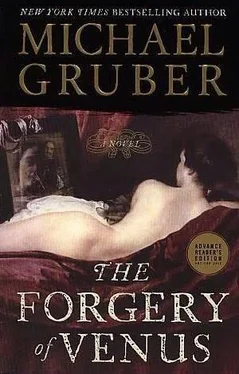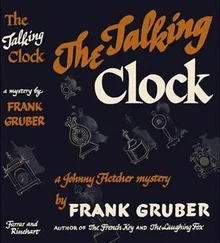“But I’m not Picasso.”
“Not yet, you’re not. But you are certainly going to be rich, and I am a long-term investor.” With that, he lifted a worn leather briefcase, opened it, removed a folder, slipped in the two drawings, and snapped it shut again. “I’m sorry to be so unforgivably crass,” he said. “But, you know, when I see a beautiful thing, I want to snatch, snatch…”
He illustrated this tendency with a grabbing motion of his right hand and contorted his face into a mime of feral avarice that I thought was rather more often its resting state than the avuncular one he had foisted off on my ex.
But we were all pals now, and so we both laughed politely at this display, and I had the waiter bring me biscotti and cappuccino, and the rest of the hour passed pleasantly enough in talk about painting and markets and what to see in Rome. Then Krebs had to leave for an appointment and avowed he was desolated that he could not ask us out to dinner, but he had to be in Stuttgart that evening. Another time, perhaps. He actually kissed Lotte’s hand as he left.
“So what did you think?” I asked when he was gone.
“Well, what I think is that if his checks continue to clear at the banks, you are the luckiest painter of this age. He is in love with you. I have seen it before: a rich collector is ravished by an artist, he cannot do enough for this person, he courts, he buys…and it is wonderful for the artist while it lasts.”
“Sometimes it doesn’t last?”
“Sadly, yes. Artists change their styles, they explore new themes, and in these the lover is perhaps not so interested. But I think that your Herr Krebs will be faithful, as long as you produce. I think he will be impatient with, let us say, a low rate of production, just as, to extend the metaphor, a rich man with a beautiful mistress would become annoyed if this mistress did not allow him the freedom of her body.”
“Gee, you make me sound like an old whore.”
“Not at all. If you have truly begun to paint as you should, there is no question of your success, either with Krebs or without. I have told you this a thousand thousand times before, but me you don’t believe and Krebs you do, only because he has the money. If he throws you out, for whatever reason, you will be very successful on the open market, especially if it becomes known that Herr Krebs is an important collector of your work.”
There was something cold in the way she said this, and now that I was looking there was something odd about her expression as well. Lotte has a frank, fearless look-it’s one of her signal features-but now it was hooded, the dark eyes sliding away from mine.
“You don’t approve?”
“I have no right to approve or not. But if you really want to know, I resent you for giving the fucking commissions to Krebs and not to me!”
“I’m sorry.”
“You’re not in the least sorry. But I have no intention of fighting about it. We’re in Rome. Take me to look at pictures!”
So we got up and went out. I have to say that even in our roughest periods, when we could barely get through a meal without fighting, we could always go and look at paintings. When a big show came to the Met or the Modern, that was a signal for a truce, and we would stroll through the crowded halls, and look, and be ravished, and be transported to the higher realms before returning to the heartbreak. And so it proved now, in a somewhat different context, because I thought there was a chance that we could return to something else, that I could convert the lie into solid ground.
I took her to the Doria Pamphili, and after we’d seen Memling take Christ down from the cross and Caravaggio show the repentant Magdalene, and the Breughels and the Raphael marvelous double portrait and the yards upon yards of filler, all those mannerist and Caravaggist patzers who make up the bulk of museum collections worldwide, we came to the Pope.
I wanted to stand next to it with Lotte, I can’t really say why, maybe for some good juju, so that her faith in me might flow into my head and revive my spirit, and in fact I did start to feel better and thought, Yeah, I can do that, I might not have invented how to do it, but now that it’s done I know how he did it, I can even sort of smell the turps off the surface of the thing, and then I’m standing there with a brush in my hand loaded with a flake-white mixture, and I’m painting the Pope’s white rochetta and there’s the high crimson silk camauro against the draperies and the throne, and there’s the actual face, turned slightly away just now as a lackey delivers a message, and then the terrible eyes are turned back on me.
And I am frightened and also excited; this is the most important painting I’ve ever done, because if he likes it he will do for me what no one else in the world can do, ensure the accomplishment of what I chiefly desire.
The brush is flying almost without conscious thought as I lay in the shadows on the white cloth-not white in the painting, of course, because white is never white, only fools paint it so with actual white paint-and I have to lean hard on the stick in my left hand to keep my brush from trembling. Another man comes in and hands the Pope a paper; he reads, says a few words, shifts in his chair. He is getting restless. I put my palette aside, bow, anticipate him: Holiness, I can finish this without your presence. It is almost done.
He rises, walks around, and considers the painting on the easel.
“You are no flatterer, Don Diego.”
“No, Holiness, I paint the truth as I see it. Truth is of God.”
And I think, almost before the words slip out, Jesus Maria, I am ruined, did I dare instruct the Pope on religion?
For an instant there is a sharp look, and then, thank Christ, a small cat smile forms on his hideous face.
“It is too true,” he says, “but still, it pleases me. And what is that paper I am holding?”
“It is my fancy, Holiness. A letter from myself, a petition.”
“Yes? What sort of petition?”
“For your support, Holiness. I wish to make casts of the Belvedere statues and other sculptures belonging to the Holy See. It would please my master.”
The Pope nods. “I will speak of this to the camerlengo. Your king is a well-beloved servant of the Holy Church.”
He turns to go, and with my heart in my throat I say, “And Holiness, a petition on my own behalf, with your permission.”
He turns, a little impatiently. “Yes?”
“I wish to become a knight of the military order of Santiago. In Spain, they still believe that painters, however noble their birth, cannot aspire to such honors. My family is of pure blood back to the most ancient times, and yet I fear my profession will undo me in this effort.”
A pause. That sly smile again. “Then we must inform them that in our Italy such is not the case.”
For a second I’m looking at the painting on the wall and the throne is empty, and then there’s the portrait again and a guard is holding my elbow, asking me what I’m doing, not amused. Lotte is standing next to him, white faced.
I could barely stand. I asked him what was up and he told me I had been mumbling to myself and trotting around the museum bumping into people. He advised me to go home and sleep it off.
I faced Lotte and she was frantic, she said I’d started talking to myself, that I’d walked off like I was going somewhere without a word to her, and that the guard had been right, I’d been acting like a crazy person, and what was going on?
Stupidly, I said it was nothing, when it clearly wasn’t, like that tired joke about the guy in bed with another woman and his wife’s standing there and he goes, “Who’re you going to believe, me or your own eyes?” And then she went into a whole thing about she couldn’t stand it, I was sick, and I was going to screw up this new opportunity with Krebs, just like I’d screwed up the rest of my painting career, but she wasn’t going to be an enabler, she was done with that, and I had to get professional help, I’d always been crazy, I’d destroyed myself because of my damned narcissism about my precious work, and how I’d let it destroy our marriage, oh, no, every great artist in the world had sold their work in galleries, but Chaz Wilmot was too good for that, I’d rather see our son dead, and she pitied me, and she swore she’d never speak to me again or let me see the kids until I was in a damned mental hospital where I belonged.
Читать дальше












